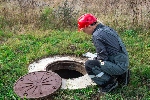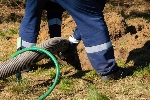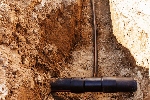Cold weather can be tough on your home's plumbing system, and frozen pipes can burst, resulting in water damage and costly repairs. Pipes in unheated areas like basements, attics, and exterior walls are most vulnerable, and common signs of trouble include slow drains, strange noises, or low water pressure.
Taking steps to protect your plumbing can avoid unnecessary stress, including measures like insulating pipes, sealing air leaks, and keeping your home at a consistent temperature. Being aware of potential problems also enables you to catch them early before they cause damage.
Understanding the Impact of Cold Weather on Plumbing
Cold weather can cause serious problems for your home's plumbing. When temperatures drop, pipes can freeze and burst as the materials react to temperature changes.
Avoiding Frozen Pipes
Water expands when it freezes, applying pressure to pipes, and as the water turns to ice and expands, it can cause pipes to crack or burst. Pipes in unheated areas are most at risk, including those in basements, attics, and exterior walls. Metal pipes also freeze faster than plastic ones.
To prevent frozen pipes, keep your home warm, even when you’re away. During winter, you should also open cabinet doors to let warm air reach pipes under sinks and let faucets drip slightly to keep water moving.
Expansion and Contraction in Plumbing Materials
Different plumbing materials react to cold in various ways. For example, metal pipes shrink in cold weather and expand when in warm weather, loosening joints over time. Plastic pipes are more flexible and can handle some expansion, but extreme cold can make them brittle.
Check your plumbing regularly for signs of wear, looking for cracks, rust, or moisture around pipes and joints.
Preventative Measures to Protect Your Plumbing
Cold weather can damage your plumbing if you're not careful so follow a few simple steps to keep your pipes and fixtures safe during winter.
Insulating Pipes and Fixtures
Pipe insulation is essential to prevent frozen pipes and a cheap and easy measure is to buy foam pipe sleeves at hardware stores. Wrap them around exposed pipes in unheated areas and pay special attention to pipes near exterior walls.
For extra protection, use heat cables on problem pipes as these electric cables warm pipes to stop them from freezing. Simply wrap it around the pipe before adding insulation.
Your outdoor spigots also need insulating and you should use foam faucet covers that slip right over them to block cold air.
Proper Maintenance of Water Heaters
Your water heater works harder in winter which increases the chance of a breakdown. This is why it is recommended to have a professional check it in the fall each year. They'll flush out sediment, test the pressure relief valve, check for leaks, and ensure your thermostat is set correctly.
Preparing Outdoor Plumbing for the Freeze
There are 4 key things to remember for your outdoor plumbing before freezing weather hits.
- Disconnect garden hoses before the first freeze, drain them and store them inside.
- Leave outdoor faucets open to let water drip out.
- Shut off and drain in-ground sprinkler systems and blow out any leftover water with an air compressor.
- Close interior shut-off valves for all outdoor plumbing.
Identifying and Responding to Winter Plumbing Issues
Cold weather can cause several plumbing problems in your home. Knowing how to spot and fix these issues quickly can save you from stress and costly repairs.
Dealing with Frozen Pipes and Potential Bursts
There are obvious signs of a frozen pipe such as no water flow or strange noises. If you suspect frozen pipes, turn off the main water valve immediately. Then thaw pipes safely using a hairdryer or heating pad. Never use open flames such as a lighter. Keep faucets open to let the water flow as the ice melts.
Addressing Clogged Drains in Cold Temperatures
Cold weather can make existing clogs worse as grease and soap scum harden in low temperatures, leading to stubborn blockages. Use a plunger or drain snake to clear minor clogs, but for tougher blocks, try a mix of baking soda and vinegar. Pouring hot water down the drain afterward.
Avoid harsh chemical cleaners as they can damage your pipes, especially in cold weather. If DIY methods don't work, call a professional plumber who will have the correct tools to unblock your system.
Emergency Measures for Sudden Plumbing Failures
Quick action is key for sudden leaks or bursts and you should first shut off your main water valve to stop water flow. For small leaks, use pipe repair tape as a temporary fix, and for bigger issues, call emergency plumbing services. It’s always a good idea to have basic tools like wrenches and duct tape ready for quick fixes.
Professional Plumbing Services and When to Seek Help
Knowing when to call a plumber can save you time, money, and stress. Regular maintenance helps prevent major issues, while quick action during emergencies minimizes damage.
Routine Plumbing Service Considerations
A trained plumber can inspect your pipes, fixtures, and water heater for wear and tear, clean drains, fix leaky faucets, and adjust water pressure. Regular service keeps your system running smoothly and extends its life. It's cheaper to maintain than to repair big problems later.
Ask your plumber about winterizing pipes to prevent freezing so they can add insulation where it’s needed and show you how to protect outdoor faucets.
Evaluating the Need for Emergency Plumbing Services
Call a plumber right away if you have:
- Burst pipes
- No water
- Sewage backups
- Major leaks
These issues can cause serious damage to your home and you shouldn’t try to fix them yourself. However, for less urgent problems, like slow drains or dripping faucets, you can usually wait till morning for regular business hours. But don't ignore them - small issues can become bigger problems if left alone.
If you're unsure, many plumbers offer 24/7 phone support and can help you decide if it's an emergency.
Speak to us today to arrange an inspection of your plumbing system to winterize your property as soon as possible.












